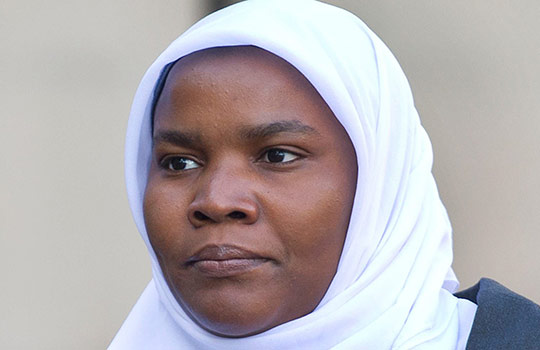This mismatch is the elephant in the room, and the key to understanding the medical profession’s response to the Bawa-Garba case
 For a hungry press, the case of Hadiza Bawa-Garba is the gift that just keeps giving. It has all the ingredients for necessary outrage: the death of a disabled child, protracted legal proceedings, and angry patient advocates who perceive the closing of ranks by a profession more willing to protect their own than admit responsibility for clinical failings. The case drives a wedge deeper into the increasingly fractured relationship between the profession and its regulator, the General Medical Council (GMC). Such professional distrust makes for good stories; suspicion sells in all directions.
For a hungry press, the case of Hadiza Bawa-Garba is the gift that just keeps giving. It has all the ingredients for necessary outrage: the death of a disabled child, protracted legal proceedings, and angry patient advocates who perceive the closing of ranks by a profession more willing to protect their own than admit responsibility for clinical failings. The case drives a wedge deeper into the increasingly fractured relationship between the profession and its regulator, the General Medical Council (GMC). Such professional distrust makes for good stories; suspicion sells in all directions.
In response, doctors have written open letters to highlight mitigating factors, and appeal for legal and regulatory recognition of system pressures in individual cases. They call for the support of an open learning culture, rather than the public shaming of individual clinicians. No doubt this expression of their solidarity will be portrayed by some as typical of the medical profession’s protectionism: defensive, dismissive and indignant. But to do so is to misunderstand the motivations and fears of those working in the maelstrom of acute hospital care.
The profession’s reaction to this case reflects a deep anxiety around an injustice that affects our own: doctors’ direct control over patient outcomes is loosening, while the grip of accountability is tightening. It is a mismatch between control and responsibility; a progressively problematic dichotomy between devolution and influence. And, like most highly charged disputes, it is also about power.
The factors driving this mismatch are multiple and complex. An eagerness to dismantle a perceived paternalistic medical establishment was an important factor in the socio-political movement to democratise healthcare; this included the patient choice agenda, increased acknowledgement of the multi-disciplinary team, shared decision-making, and ultimately, a dissolution of hierarchies. Furthermore, doctors who entered the profession thinking they would “practice medicine” have found themselves in a paradigm that understands healthcare as a product to be delivered and consumed, rather than a relationship with human expertise.
These interprofessional trends, combined with growing system complexity, have dispersed personal influence enough to outstrip any one clinician’s ability to reliably exert control over an outcome. The presumption that a doctor “makes an order” and others dutifully and obligingly follow suit is not only considered socially unacceptable, it is simply no longer the case.
This power shift in healthcare is rightly celebrated; in and of themselves, these dynamics can only be seen as progressive. The rub lies in the interplay of these dynamics with the reality of acute hospital medicine. Like a stain on the wall that many layers of paint have not been able to hide, there is an abiding truth understood by those on the shop floor: when it comes to acute inpatient care, doctors are still the clinical decision makers. Yet critical factors contributing to the outcome of a clinical plan—the efficiency and fidelity of its execution, or whether the environment was conducive to good decision-making—are not only considered relative small print, they are increasingly beyond a doctor’s control. Nonetheless, these decisions can be interrogated by professional regulators, scrutinised in court, and publicly dissected in the media. The potential consequences for an individual clinician are huge.
However, doctors are, after all, best placed to be put in this position. Our decision-making capacity is, in large part, why we are paid more than other members of the clinical team. The depth, breadth, and length of our training is unmatched. A willingness to take necessary calculated risks is a distinguishing feature of the doctor’s role; it is the reality of clinical medicine, and should not be shirked. But complex systems and convoluted authority dynamics have now rendered the link between these decisions (or the ability to make them) and the outcome more indirect and compromised than ever before. This is why a debate regarding accountability is raging.
We are left with a “wicked” problem: I have difficulty envisioning a legal and regulatory landscape that is truly nuanced enough to adequately evaluate accountability when clinical decisions are made within such a devolved system. Nor am I convinced that we yet have a comparable model from which to learn. Such a model would have to recognise an ecosystem wherein human transactions occur in the context of uncertainty, urgency, huge expectation, and trade in the currency of human life. Furthermore, the model would also have to reflect the fact that clinical decisions are made in the context of an expertise gradient, yet actioned within a flattened team hierarchy. The aviation industry and the military are so often wheeled out as exemplars of industries that have successfully navigated this minefield. There are certainly lessons to be learned from their systems management expertise, but there are fundamental differences in our respective pressures and motivations that can render direct comparisons unhelpful.
Unfortunately this argument, calling for an honest debate around control and responsibility in acute hospital care, is highly vulnerable to misinterpretation. It could be wrongly read as a debasement of the multidisciplinary team, a campaign for the reinstitution of the medical autocrat, or an exaggeration of the system pressures on the decision maker. I imply none of these. Yet it still feels strangely taboo to be airing this argument in public. The assumption that an authority gradient inevitably drives personal disrespect for those lower down the “pecking order” is perhaps to blame. A school of thought which automatically conflates decisional hierarchy with interpersonal relations is a confused one, and needs to be challenged.
I must also clarify: this argument is not a commentary on the specifics of the Bawa-Garba case, but an attempt to explain the forces behind our professional response to it. Neither is this argument a denial that serious mistakes are made by individual clinicians—history has clearly shown that this is commonplace—but challenging the validity of individual accountability within devolved systems is a separate and evolving issue.
Healthcare is becoming the commodity of our time, and will no doubt be the scene for many a power struggle yet. But if the mismatch between control and responsibility continues to grow, a point is reached when the role of “difficult decision maker” in this arena looks very unattractive. Reaching such a tipping point carries a risk: young and old doctors alike will look at what’s on offer and choose not to throw their hat into the ring. Some may well celebrate this point as a necessary and progressive feature in the pursuit of democratised healthcare. My concern is that attrition of individuals with both the expertise and willingness to make difficult decisions does our patients no favours at all.
Robin Baddeley, editorial registrar, The BMJ.
